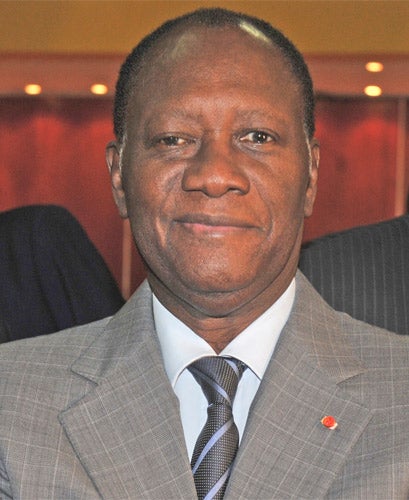Profile: Outtara, the quiet man with connections

Your support helps us to tell the story
From reproductive rights to climate change to Big Tech, The Independent is on the ground when the story is developing. Whether it's investigating the financials of Elon Musk's pro-Trump PAC or producing our latest documentary, 'The A Word', which shines a light on the American women fighting for reproductive rights, we know how important it is to parse out the facts from the messaging.
At such a critical moment in US history, we need reporters on the ground. Your donation allows us to keep sending journalists to speak to both sides of the story.
The Independent is trusted by Americans across the entire political spectrum. And unlike many other quality news outlets, we choose not to lock Americans out of our reporting and analysis with paywalls. We believe quality journalism should be available to everyone, paid for by those who can afford it.
Your support makes all the difference.As UN helicopters rained down rockets, French missiles lit up the night sky and thousands of tanks rolled into battle in Abidjan, Alassane Ouattara sat speaking on the telephone with French President Nicolas Sarkozy.
Sheltering in a suite of rooms at the heavily guarded Golf Hotel, where he has sat out most the of the four-month crisis, Mr Ouattara was doing what he does best: working his international contacts. On a similar night in 2002 when Abdijan was in flames, the softly spoken economist hid at the home of a French diplomat, while death squads dispatched by his long-time rival Laurent Gbagbo hunted for him because of his rebel links.
Then as now it was international support that sustained him. In fact, the backing he has received has far outstripped that given to Kenya's Raila Odinga or Zimbabwe's Morgan Tsvangirai after stolen elections in their countries.
Alassane Dramane Ouattara, or "Ado" as his supporters call him, has been cast as an outsider by his rivals in Ivory Coast, who went as far as changing the constitution to paint him as a foreigner and point to his background as an economist in Washington to say he's a foreign stooge. But the banker has been an insider in the halls of power for most of the last 40 years.
His dealings with the French president go back to at least 1990, when Mr Sarkozy – then mayor of Neuilly-sur-Seine and a rising star – conducted Mr Ouattara's wedding to his Franco-Jewish wife, Dominique Nouvian Folloroux. Later that year, Mr Ouattara, a protégé of Ivory Coast's independence leader Félix Houphouët-Boigny, briefly became prime minister. After his patron died three years later, Mr Ouattara was forced to resign. His subsequent opponents have always tried to block his return by accusing him of not being Ivorian, and claiming his links to Mr Sarkozy made him a French "stooge," although the men are said to have had little contact in recent years.
Born in what was French West Africa in 1942, with parental links to Burkina Faso, his enemies invented an entire ideology "Ivoirite" to undermine him and let the state media demonise him as a "foreigner". The cost of this political expediency has been violent xenophobic attacks. For decades after independence, Ivory Coast was the bank, factory and breadbasket of the region. Colonial borders that cut arbitrarily through the ethnic groups were largely ignored by economic migrants who came to join the comparative prosperity.
The repeated attempts to block the political aspirations of Mr Ouattara made him a symbol for many of them in the marginalised and mainly Muslim north. And they were his support base last year when international insistence saw the economist onto the ballot for an historic election.
The 69-year-old took and held the high ground throughout the controversy and violence which followed his victory last November. His contacts in Washington, where he rose to the number two job at the International Monetary Fund, and his network in Europe have helped to cement international support for his cause.
At the IMF he worked under French economist Michel Camdessus who later spearheaded Tony Blair's Africa Commission and sits on the influential Africa Progress Panel. While his rival Mr Gbagbo refused Barack Obama's retirement offer of a history professorship in Boston, the UN and foreign migrants, in an effort to whip up his supporters, "the foreigner", spoke calmly of his forces "restoring democracy".
As usual, the 69-year-old has quietly won international support for his position. President Sarkozy insisted before the November election that France would not take sides. Some African experts in France believe that, privately, Mr Sarkozy favoured Mr Ouattara as an "old friend" but also as a "liberal" politician. The IMF dossier on their former luminary ends with a simple assertion that has bedevilled politics in the West African nation for nearly 16 years: "[Mr Ouattara is] an Ivoirien national," it reads.
Join our commenting forum
Join thought-provoking conversations, follow other Independent readers and see their replies
Comments